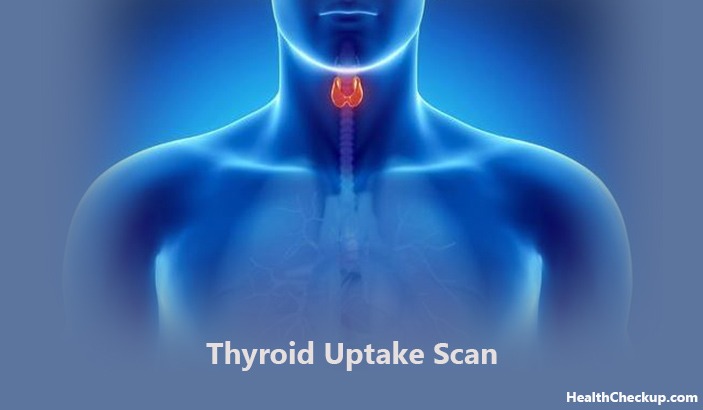The thyroid is an extremely important gland that is responsible for the production of the thyroxin hormone. But both overproduction and underproduction of thyroxin can lead to health problems. There are two main types of thyroid problems – hypothyroidism and hyperthyroidism. The radioactive iodine uptake test or RAIU test is a type of thyroid test that is done to find problems with how the thyroid gland works, such as hyperthyroidism (overactive thyroid).
What is a Radioactive Iodine Uptake Test?
It is sort of a thyroid uptake scan which measures the amount of radioactive iodine that accumulates in the thyroid gland after it is taken orally. It is accompanied by a similar test known as the thyroid scan. Radioactive iodine uptake test is an important part of hyperthyroidism treatment that helps to find the cause of an overactive thyroid gland. It helps the doctor to plan the proper path of treatment for hyperthyroidism.
How the Radioactive Iodine Uptake Test is Performed?
For this iodine test, the patient is asked to take a small oral dose of radioactive iodine or radioiodine. The patient is then checked after a certain period of time (usually 4 or 6 hours) to note the amount of iodine absorbed by the thyroid gland. The iodine collects in the thyroid gland because thyroid uses iodine to produce the hormones. A radioactive tracer and a gamma probe are used to trace the quantity of iodine that has been absorbed by the thyroid gland.
How the Radioactive Iodine Uptake Test works?
The thyroid is a small, butterfly shaped gland located in the neck and it controls the metabolism of the body with the help of the hormone thyroxin (T4). This hormone is produced by the thyroid gland as a response to a pituitary hormone known as the thyroid-stimulating hormone (TSH). The thyroid gland absorbs iodine from the body in order to produce thyroxin.
The Radioactive Iodine Uptake Test uses radioactive iodine as a radiotracer. The thyroid scan clearly shows how much of this radioactive iodine is absorbed by the thyroid, which in turn determines how well the thyroid gland is functioning.
Steps to Prepare for the Radioactive Iodine Uptake Test
- You will be asked to fast for 8 hours before the iodine test.
- Before performing an iodine test, blood tests may be done to measure the levels of thyroid hormones (TSH, T3 and T4) in your blood.
- The health care provider may restrict thyroid medications and iodine for 1 week before the test.
- You may be asked to avoid foods containing iodine such as iodized salt, sea weed, kelp, shellfish, takeout meals etc. because it can interfere with the test results.
- Vitamins and nutritional supplements containing iodine may also be restricted.
- Certain medicines that increase iodine absorption by the thyroid gland (estrogen, lithium, TSH, antihistamines, anti-thyroid drugs, nitrates, tolbutamide, etc.) may be stopped temporarily before the scan.
Radioactive Iodine Uptake Test Procedure
On the day of the test you will be given a radioactive iodine pill or liquid containing radioactive iodine. It takes some time for the iodine to make its way into the body and to be absorbed by the thyroid gland. You will be allowed to eat within an hour or two after swallowing the radioactive iodine. But you will need to follow the dietary restrictions till the end of the test. You will be asked to return to the test centre twice, once after 6 hours and once after 24 hours of consuming the radioactive iodine. For the scan, you will be required to lie on your back with your head tilted backward and your neck extended. It is essential to lie absolutely still. During the scans a technician will place a gamma probe on the outside of your neck. Each scan will take around 10 to 30 minutes to perform. You will experience no pain during the scan and you will be able to resume a normal diet once the test is complete. Your body will excrete the radioactive iodine through your urine within 24 to 48 hours of the test. There is no need to worry about the use of radioactive iodine in the scan because the dosage is extremely small.
Precautions after the Radioactive Iodine Uptake Test
You can get back to regular activities after the test but you should take special precautions when you urinate for the next 24 hours. Your body will get rid of the radioactive tracer through your urine and during this period it is important to flush the toilet twice every time you use it and wash your hands thoroughly with soap and water after each time you urinate.
Results of the Radioactive Iodine Uptake Test
The normal results for radioactive iodine uptake test are as follows:
6 hours: 3 – 16%
24 hours: 8 – 25%
The results of your scan are analysed by the doctor depending on your blood work and other tests such as thyroid scan. If your thyroid retains less iodine than normal then it means that your thyroid is inflamed and it is not producing or retaining thyroxin adequately.
If your thyroid absorbs more iodine than normal then it means the gland is producing too much of thyroxin and it is a case of overactive thyroid or hyperthyroidism.
Risks Associated with Radioactive Iodine Uptake Test
There are no dangerous side-effects of the radioactive iodine test because the dose of radiation used is negligible. But, as a precautionary measure this test is not recommended for pregnant and breast-feeding women. Radioactive material exposure can pose potential risks for a foetus or a new born baby. Inform your doctor in case you are pregnant or are a nursing mother. Your doctor will use some other means like blood work or physical exams to monitor your condition. Inform your doctor if you are allergic to iodine, because it can interfere with the test and results.
The radioiodine uptake test helps your doctor to determine the exact cause of hyperthyroidism so that he can plan the treatment accordingly. Consult with your doctor about the meaning of your test results and know how to proceed with the treatment.
Medically Reviewed By









